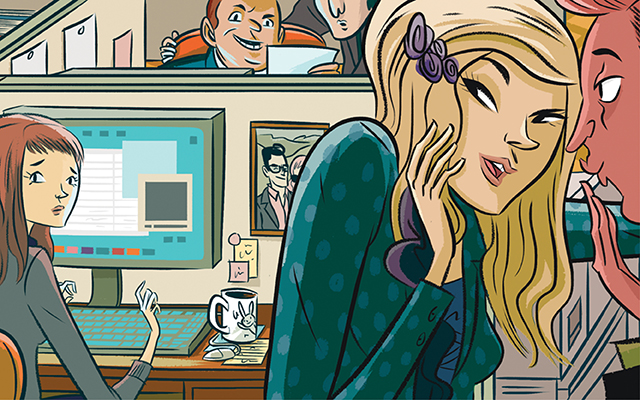My jaw dropped the first time I heard my boyfriend play his guitar. His fingers danced across its nylon strings, pulling lovely sounds from its belly. I was dazzled by his talent. When an opportunity came for him to play with a group of local musicians, I encouraged him to pursue it.
So I scarcely recognized myself a couple of months later, as I sat at our kitchen table angrily glaring at him from behind a cup of coffee. The weekly jam sessions had progressed from a “sore spot” between us to an “open wound,” and I awoke on their scheduled days besieged by ugly feelings: How could I feel so jealous over an activity I had advocated for? How could I possibly resent a talent I admired? When my jealous funk finally erupted into an argument, I burst out with some unexpected words: “I want you to play with me!”
It wasn’t even true – at least, not in the musical realm; I don’t play an instrument. But then it hit me:
The source of my jealousy wasn’t the time, energy or money he was lavishing on his new activity, it was the frustration that we no longer did creative things together.
While I had creative endeavors of my own, I missed the fantastic art projects we once envisioned, the little drawings we’d leave for each other, the way I always felt inspired and, in turn, inspiring. I realized how much I valued that creative interplay and how it had lately faded into the hum of routine.
I don’t know how far that partnership might have slipped had my jealous feelings not alerted me, but the awareness they brought helped us regain our footing. It also offered me a valuable insight: Jealousy, so often viewed as a negative and undesirable emotion, can actually help us identify the things we value most, and inspire us to pursue or protect them in ways we might otherwise not.
What Does Jealousy Feel Like?
Jealousy is rarely pleasant. It’s a complex response to an under-recognized desire to have (or experience or know) something that we don’t currently – at least not at the level we’d like. And as such, jealousy is custom designed to raise our hackles. But by noticing where jealousy arises, we can get some helpful clues about the parts of ourselves – or of our lives – that are asking for attention.
Jealousy has a lot to teach us, because how and when it crops up is largely determined by what we value or desire. Initially, though, we may feel jealous without fully understanding why, and without really knowing what to do about it.
Imagine, for example, that you see your sweetheart engaged in an intimate conversation with someone else. Or that you see a professional rival receiving public accolades. Psychotherapist Windy Dryden, PhD, author of Overcoming Jealousy, calls such moments “activating events,” and they can ignite a firestorm of emotional reactions, assumptions and resentments that do little to move us closer to our core desires and may actually work against us.
By shifting our attention away from the external “cause,” and toward the underlying desires behind our jealous feelings, says Rachelle Disbennett-Lee, PhD, author of 365 Days of Coaching: Because Life Happens Every Day, we can learn more about what really matters to us – and elevate our response accordingly.
We stand to benefit most from jealousy’s potential gifts, Disbennett-Lee notes, when we take time to evaluate what emotion or emotions lie at the heart of the matter, and why: “If we can stop ourselves and say, ‘What is it that I’m really feeling? Am I disappointed that I’m not in a relationship with someone? Do I wish I could wear that outfit?’ then we can get at what’s behind the jealousy.” And from there, she says, it’s far easier to know how to take constructive, empowered action.
For example, let’s say you feel an angry sort of jealousy about a coworker’s promotion. First, you might pause to consider if your jealousy is more about the money, about the recognition, or about the status and authority conferred.
If it’s really about the recognition, jealousy may be telling you that you have a strong desire to be more appreciated for your strengths – and perhaps also that you need to be more aggressive in claiming and growing those strengths in ways that net you the accolades you desire.
Noticing where our jealousy is ignited tends to help us see where we might focus on expressing and responding to those desires more fully. As Ohio-based relationship coach Otto Collins explains, “Jealousy is an opportunity to get in touch with your wants and needs, and to assess what your expectations are, for yourself, and for others.”
Listening Lessons
Insights into what feeds our jealousy can be mobilizing, says Disbennett-Lee. “I don’t get jealous – I get inspired,” she says. “Too often, we look at people of whom we feel jealous and think that their success is the exception. It’s not true. They’re merely examples: If she can do it, I can do it, too.”
At other times, our insight might lead to deeper personal wisdom. Disbennett-Lee recalls feeling jealous of another woman’s athletic physique at the gym – until her trainer described the kind of time and energy investment required to achieve and maintain that level of fitness. Realizing that level of effort didn’t jibe with her current core values and priorities, Disbennett-Lee was able to say, “Good for her, but that’s not for me,” and to release her jealousy accordingly.
“People who are willing to explore their intense emotions, positive as well as negative, may even discover that jealousy can make life more passionate and interesting,” Alayah Malach Pines, PhD, writes in Romantic Jealousy.
That’s part of what I discovered when I listened to what jealousy was telling me about my boyfriend’s jam sessions. I could finally articulate the source of my discomfort and act to ease my pain. And we began to make time for shared creative activities again, which invigorated our relationship.
But jealousy also helped me find my way back to a sweet place where I could once again enjoy his playing – and the music that had inspired me to crave our creative partnership in the first place.
What Jealousy Can Teach Us
If we listen carefully, jealousy can speak to us about our own unrecognized or unclaimed desires. This awareness can suggest new, constructive courses of action that take us beyond resentment – and toward satisfaction.
If jealousy crops up around your partner’s Friday night card game, maybe you’re itching for a livelier social life or to connect with a personal passion of your own. Or maybe you wish you and your partner had more fun together. Ask what you’re longing for. Listen for the desire underneath the frustration, then consider how you might honor it.
Suffering from Body Envy? Explore whether this might be an expression of your own desire to become more fit and body confident, or perhaps a call to pay more attention to your physical well-being. Have long-held frustrations and judgments about your body been preventing you from taking positive steps to support it and appreciate it? Jealousy may be inviting you to make more conscious choices.
Jealous of a coworker’s promotion? Perhaps you’re feeling overlooked and underappreciated. Or maybe you’re in need of a career path that challenges you to achieve. Your chosen response will depend on the core feeling you discover. When you focus on what you desire (as opposed to what you resent), you’ll be on a faster track to achieving it. (For more on this, see “How to Be Happy for Others“.)
This article has been updated. It originally appeared in the June 2007 issue of Experience Life.




This Post Has 0 Comments